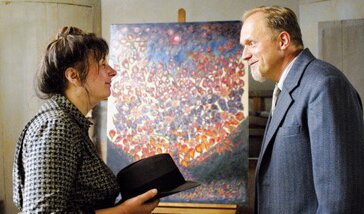|
| Tookey's Review |
|
| Pro Reviews |
|
| Mixed Reviews |
|
| Anti Reviews |
|
| Trailer |
|
| Cast |
|
| |
 |
| |
| Released: |
2008 |
| |
|
| Genre: |
DRAMA
FOREIGN
BIOPIC
|
| |
|
| Origin: |
France |
| |
|
| Colour: |
C |
| |
|
| Length: |
121 |
|
| |
|
| |
|
|
| |
|
|
Portrait of the artist as a middle-aged woman.
|
Reviewed by Chris Tookey
|
Most excellent feature-length films are stories. A few are like poems – static or uninteresting in a narrative sense, but involving because of the mood they create, and the emotions that they illuminate.
Such a film is Seraphine, winner of seven Cesars (the French Oscars). It has a lyricism, passion and beauty unmatched in cinema this year.
Don’t expect car chases. Unfolding over two decades at a leisurely pace (and just over two hours of real time), this is a celebration of Seraphine de Senlis (Yolande Moreau, pictured left), a lowly cleaner and laundress by day but a brilliant painter in her limited free time. She was so poor that she had to improvise her own paints, using blood, soil and candle wax.
The film shows her discovery before the First World War by the German art critic and dealer Wilhelm Uhde (Ulrich Tukur, pictured right), who appreciated this matronly, middle-aged woman as an artist with the same flair for colour and movement as Vincent van Gogh.
Writer-director Martin Provost captures elegantly the simple faith of an artist who felt she was guided by her Guardian Angel. There is something of Joan of Arc in Seraphine’s religious ecstasy and love of nature. It is unusual and welcome to see a film in which religious belief is not patronised
The film suggests that Seraphine received no training in art, when in reality she sat in on art classes in Paris. However, she was mostly self-taught, and – as the film hints - her paintings were derided as out of touch with the fashions of her day. Provost allows us to see the paintings and judge her talent for ourselves. It is easy to see what appealed to Uhde, who was an early champion of Picasso and Braque and discovered Rousseau. Her late works are extraordinary.
The film is, courageously, the story of a purely professional relationship. Uhde was a bourgeois aesthete and a homosexual. Seraphine was a peasant. They had nothing in common except a love of her art. Quite apart from its other merits, the film pays eloquent testimony to the role good critics can play in introducing unfamiliar talents to a wider audience.
Seraphine is an old-fashioned film of the kind excoriated by the French “new wave” in the 1960s. It belongs to the tradition of Jean de Florette and, before that, the films of Marcel Pagnol, Jean Renoir and Robert Bresson. It is none the worse for being out of kilter with our frenetic, and too often insensitive, modern times.
|
|
|
